新概念英语第一册73-74课
- 格式:ppt
- 大小:1017.00 KB
- 文档页数:7
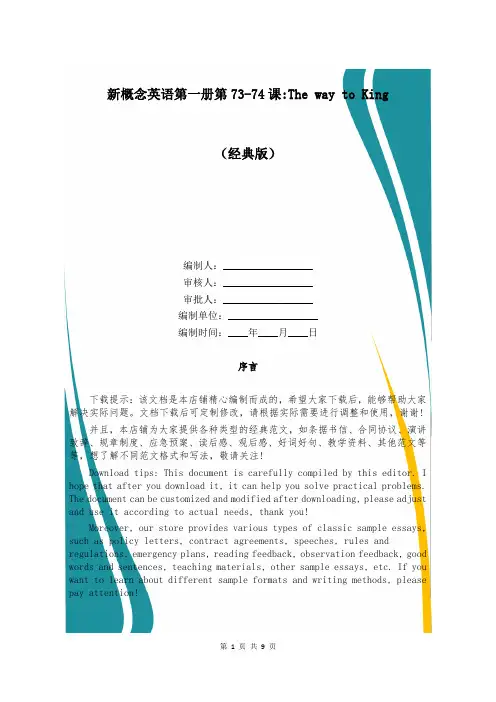
新概念英语第一册第73-74课:The way to King(经典版)编制人:__________________审核人:__________________审批人:__________________编制单位:__________________编制时间:____年____月____日序言下载提示:该文档是本店铺精心编制而成的,希望大家下载后,能够帮助大家解决实际问题。
文档下载后可定制修改,请根据实际需要进行调整和使用,谢谢!并且,本店铺为大家提供各种类型的经典范文,如条据书信、合同协议、演讲致辞、规章制度、应急预案、读后感、观后感、好词好句、教学资料、其他范文等等,想了解不同范文格式和写法,敬请关注!Download tips: This document is carefully compiled by this editor. I hope that after you download it, it can help you solve practical problems. The document can be customized and modified after downloading, please adjust and use it according to actual needs, thank you!Moreover, our store provides various types of classic sample essays, such as policy letters, contract agreements, speeches, rules and regulations, emergency plans, reading feedback, observation feedback, good words and sentences, teaching materials, other sample essays, etc. If you want to learn about different sample formats and writing methods, please pay attention!新概念英语第一册第73-74课:The way to King新概念英语第一册第73-74课:The way to King StreetLesson 73 The way to King Street到国王街的走法Listen to the tape then answer this question。
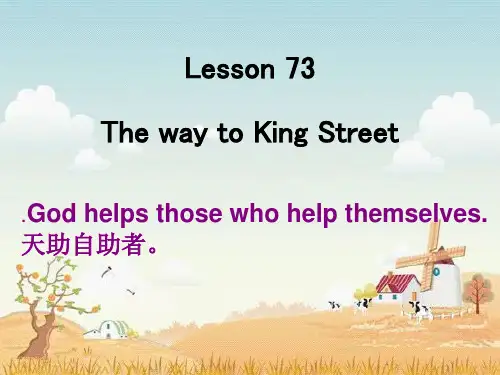
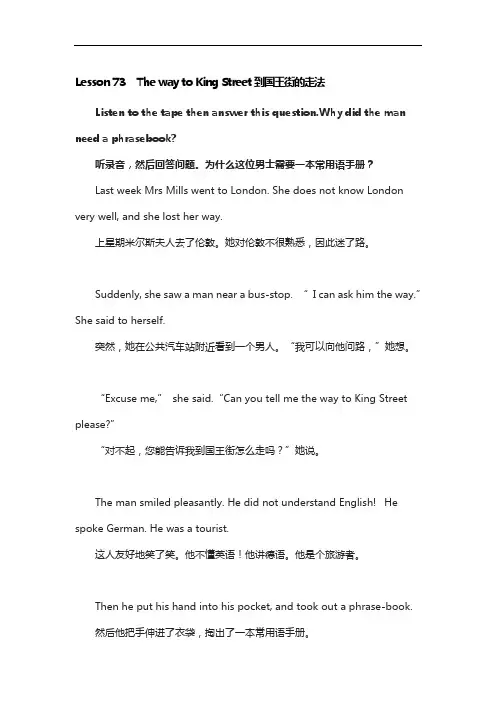
Lesson 73 The way to King Street到国王街的走法Listen to the tape then answer this question.Why did the man need a phrasebook?听录音,然后回答问题。
为什么这位男士需要一本常用语手册?Last week Mrs Mills went to London. She does not know London very well, and she lost her way.上星期米尔斯夫人去了伦敦。
她对伦敦不很熟悉,因此迷了路。
Suddenly, she saw a man near a bus-stop. “I can ask him the way.”She said to herself.突然,她在公共汽车站附近看到一个男人。
“我可以向他问路,”她想。
“Excuse me,”she said.“Can you tell me the way to King Street please?”“对不起,您能告诉我到国王街怎么走吗?”她说。
The man smiled pleasantly. He did not understand English! He spoke German. He was a tourist.这人友好地笑了笑。
他不懂英语!他讲德语。
他是个旅游者。
Then he put his hand into his pocket, and took out a phrase-book.然后他把手伸进了衣袋,掏出了一本常用语手册。
He opened the book and found a phrase. He read the phrase slowly. 他翻开书找到了一条短语。
他缓慢地读着短语。
“I am sorry,”he said. “I do not speak English.””很抱歉,“他说,”我不会讲英语。
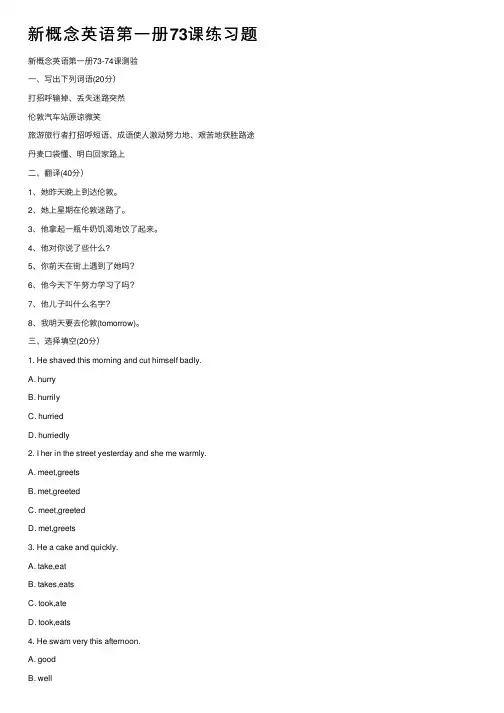
新概念英语第⼀册73课练习题新概念英语第⼀册73-74课测验⼀、写出下列词语(20分)打招呼输掉、丢失迷路突然伦敦汽车站原谅微笑旅游旅⾏者打招呼短语、成语使⼈激动努⼒地、艰苦地获胜路途丹麦⼝袋懂、明⽩回家路上⼆、翻译(40分)1、她昨天晚上到达伦敦。
2、她上星期在伦敦迷路了。
3、他拿起⼀瓶⽜奶饥渴地饮了起来。
4、他对你说了些什么?5、你前天在街上遇到了她吗?6、他今天下午努⼒学习了吗?7、他⼉⼦叫什么名字?8、我明天要去伦敦(tomorrow)。
三、选择填空(20分)1. He shaved this morning and cut himself badly.A. hurryB. hurrilyC. hurriedD. hurriedly2. I her in the street yesterday and she me warmly.A. meet,greetsB. met,greetedC. meet,greetedD. met,greets3. He a cake and quickly.A. take,eatB. takes,eatsC. took,ateD. took,eats4. He swam very this afternoon.A. goodB. wellC.D. hard5. Did he a bottle of milk this morning?A. drankB. drinkC. drinksD. drinking四、写出下列动词的过去式(20分)see read go lose takedo say find speak eatmeet are drink swim is。
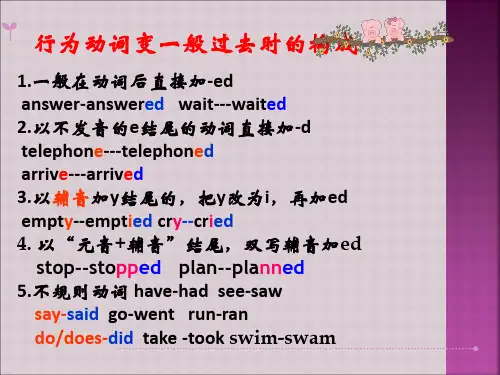
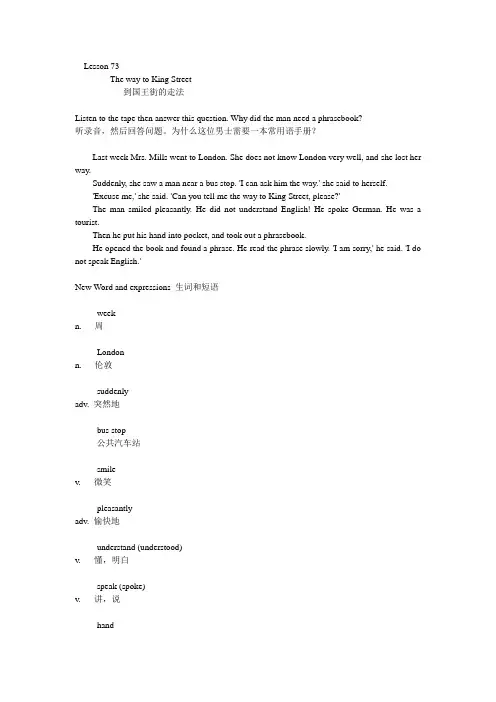
Lesson 73The way to King Street到国王街的走法Listen to the tape then answer this question. Why did the man need a phrasebook?听录音,然后回答问题。
为什么这位男士需要一本常用语手册?Last week Mrs. Mills went to London. She does not know London very well, and she lost her way.Suddenly, she saw a man near a bus stop. 'I can ask him the way.' she said to herself.'Excuse me,' she said. 'Can you tell me the way to King Street, please?'The man smiled pleasantly. He did not understand English! He spoke German. He was a tourist.Then he put his hand into pocket, and took out a phrasebook.He opened the book and found a phrase. He read the phrase slowly. 'I am sorry,' he said. 'I do not speak English.'New Word and expressions 生词和短语weekn. 周Londonn. 伦敦suddenlyadv. 突然地bus stop公共汽车站smilev. 微笑pleasantlyadv. 愉快地understand (understood)v. 懂,明白speak (spoke)v. 讲,说handn. 手pocketn. 衣袋phrasebookn. 短语手册,常用语手册phrasen. 短语slowlyadv. 缓慢地参考译文上星期米尔斯夫人去了伦敦。
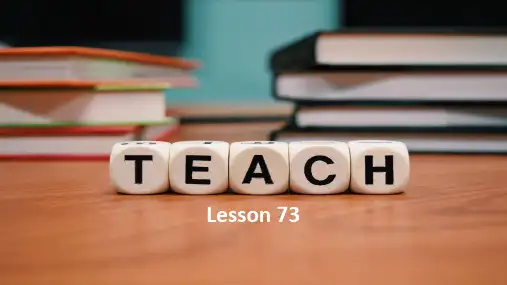
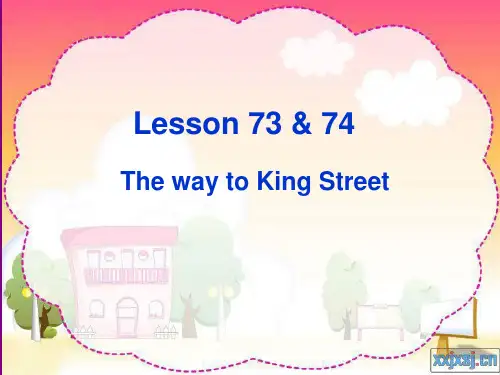

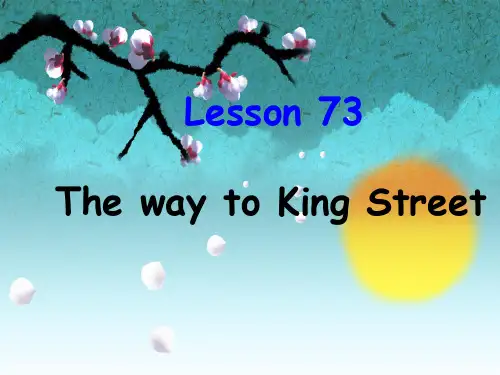
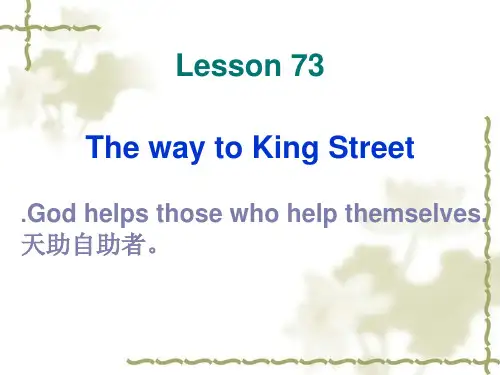
Lesson 73 单词讲解1. week: 周这周:this week上周:last week下周:next week2. London: 伦敦London is the capital city of Britain.3. suddenly: 突然地4. bus stop: 公共汽车停靠站bus station: 公共汽车总站5. smile: 微笑laugh: 大笑v./ n.He said and smiled.She is telling me a story with a smile.They are talking and laughing.6. pleasantly: 愉快地7. understand: 懂得、明白understand- understood8. speak: 讲话、说话speak-spokesay: 讲话、说话say-saidspeak: A. 说话的能力;B. 语言。
say: 说话的内容。
对某人说: say to sb. \ speak to sb.1) It's very cloudy now. But the radio ___it’s going to be sunny this afternoon.A. speaksB. tellsC. talksD. says2) He is super. He can ___ English, French and Chinese.A. sayB. speakC. talkD. tell3) Please______ hello to your mom.A. sayB. speakC. talkD. tell9. hand: 手a green hand: 新手10. pocket: 衣袋pocket money: 零用钱He put his hands into his pockets.11. phrase: 短语phrasebook: 短语手册12. slowly: 缓慢地Lesson 73 课文讲解1. went to - lost her way- saw- said- smiled- did not- spoke-was- put- took- opened- found- readgo to- went tolose her way- lost her waysee- sawsay-saidsmile- smileddo not- did not2. She does not know … very well.她对…不是很了解。
新概念英语第1册第73-74课课重点语法第73-74课的内容:一、重要句型或语法1、一般过去时表示过去发生的而现在已经结束的动作或状态。
本课主要学习的是动词的过去式的不规则变化,如:went, lost, saw, said, did, spoke, put, took, found, read。
2、副词本课侧重的是“形容词+-ly”构成副词的用法,如:suddenly, pleasantly, slowly。
二、课文主要语言点Last week Mrs. Mills went to London. 1)last用来表示过去的时间,但考虑到在第75课里会重点学习过去时间的表达,建议本课点到为止。
2)went为go的过去式。
She does not know London very well, and she lost her way.1)and前后两句话用了不同的时态,能够提问学生并分析其中的原因。
2)know...very well,表熟知。
lose one's way,表迷路;注意提醒学生lose的过去式形式。
Suddenly, she saw a man near a bus stop. 1)suddenly是有“sudden(形容词,突然的)+-ly”构成的副词。
2)saw为see的过去式形式。
3)stop一般用来表示公交车站,注意对比station(火车站)和机场(airport)。
I can ask him the way,' she said to herself. 1)ask sb. the way,表示向某人问路。
2)say to oneself,表示自言自语。
said为say的过去式。
Excuse me,' she said. ' Can you tell me the way to King Street, please?' 1)关于引语中的标点符号用法:此处可提醒学生,如果在引语中插入了she said这样的提示语,前面句子的末尾一般都用逗号,除了疑问句和感叹句外。